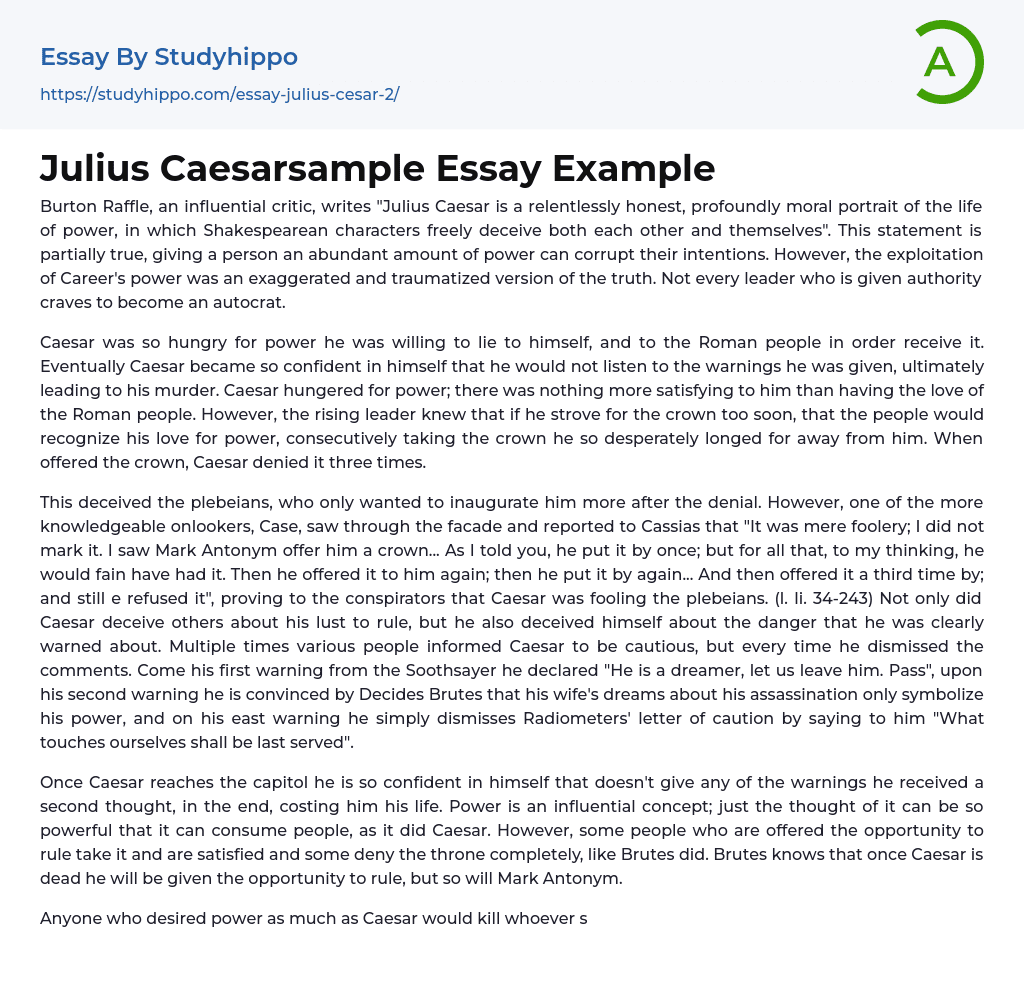Prominent commentator Burton Raffle posits that "Julius Caesar presents a candid and profoundly ethical representation of the quest for power, showcasing how characters in Shakespeare's work skillfully manipulate not only others but also themselves." While this view carries some truth—since giving someone too much power can potentially distort their objectives—it's important to note that the depiction of Caesar exploiting his authority in the play is an overstated and skewed rendition of reality. It's incorrect to assume every individual granted leadership aims to be a dictator.
Caesar demonstrated such thirst for control that he was prepared to mislead both himself and the Romans in his pursuit. His self-assurance intensified to an extent where he dismissed any precautionary advice given, which eventually led to his murder. Nothing satisfied Caesar more than earning the admir
...ation of Roman citizens owing to his unquenchable lust for dominance. However, he realized that if he made overt attempts at securing the crown prematurely, people would perceive his ulterior motives and thwart him from achieving it. As such, when offered kingship, Caesar refused thrice.
This trickery beguiled ordinary citizens who admired him even more after his rejection. Nevertheless, one observant spectator named Case saw past this pretense and informed Cassius saying "It was mere folly; I did not ignore it.I witnessed Mark Antony proffering him a crown...As I noted earlier, he declined once; yet deep within desired it.He put forth again but then retracted once more...Despite offering it for a third time, he persistently declined. This action confirmed to the plotters that Caesar was misleading the masses (l.Ii.34-243). Not only did Caesar trick others regarding his thirst for dominion, but he also
deluded himself about the clear peril he had been forewarned about. Numerous people warned Caesar to tread with caution, yet their remarks were consistently overlooked. When the Soothsayer issued his initial alert, Caesar wrote him off as a fantasist and disregarded his counsel. On interpreting her dreams as an emblem of his power in a second warning, Decides Brutes persuaded him into discounting it. Even upon receiving Radiometers' precautionary letter, he brushed it aside by declaring self-interest as paramount importance. Upon reaching the Capitol building, such was his self-assuredness that none of these warnings were pondered over again - this ultimately lead to his demise. The concept of authority is compelling; even its mere thought can overpower individuals just like it did with Caesar. Nevertheless, some seize this opportunity to govern and derive pleasure from it while others outrightly renounce sovereignty much like Brutes did so.Brutes knew that once Caesar is gone there will be an opportunity for him to rule along with Mark Antonym.
Regardless of his quest for power,Caesar would have no qualms in eliminating anyone who served as hindrance on his way.
Despite having the chance to assassinate Mark Antony, Brutus refrains from doing so, asserting "Let us be sacrifices, not butchers." This decision by Brutus safeguards Antony from getting murdered by the conspirators and indicates his lack of aspiration for power (al.I. 166). Caesar's immense crave for authority led him to mislead himself as well as those he intended to rule over, potentially morphing him into a tyrant. This supports Burton Raffle's perspective that Julius Caesar is an unequivocally truthful and profoundly ethical portrayal of power pursuit where Shakespearean characters exploit others
and themselves. Nevertheless, the play does not cover all facets of power. Julius Caesar was an ethically compromised person motivated by an unquenchable hunger for control which contrasts sharply with Brutus who exhibited no interest in ruling Rome.




